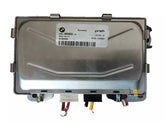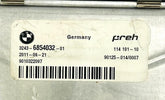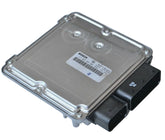Top 10 Car Brands with the Most Problems (That People Still Buy Anyway)
Automan Spare Parts | Reliable Parts for Unreliable Cars
Introduction
When buying a car, most people hope for a smooth, problem-free driving experience. But interestingly, many still choose brands that are known for reliability issues. Why? Because even cars with frequent problems can offer style, performance, or price points that make them appealing.
In this post, we’ll explore the top 10 car brands that report the most issues, based on industry data and customer feedback. We’ll also discuss why these brands remain popular, common problems they face (with year-specific examples), and what parts are most likely to need replacing—plus how you can stay ahead with the right maintenance and OEM auto parts.
Keywords: car brands with most problems, unreliable car brands, most problematic cars, car brands with issues, worst car brands, car reliability problems, Jeep reliability, BMW common issues, Tesla build quality problems, Nissan CVT issues, Land Rover reliability, Volkswagen car problems, Chrysler transmission issues, Dodge overheating problems, Fiat electrical issues, Chevrolet engine problems
Table of Contents
-
FAQs
1. Jeep![]()

Common Issues:
Jeep models, particularly the 2014-2015 Cherokee and Grand Cherokee, are known for transmission problems, including rough shifting and unexpected stalling. In 2018, the Jeep Compass had widespread electrical system faults that led to battery drain and infotainment glitches. Owners frequently report engine stalling and 4WD system malfunctions.
Why People Still Buy It:
Jeeps have an adventurous, off-road image that's deeply appealing. The rugged exterior, high clearance, and 4x4 capability make them a favorite among outdoor lovers, even if that means accepting more time in the shop.
2. Land Rover

![]()
Common Issues:
Land Rovers are notorious for reliability issues, especially in models like the 2016 Range Rover Sport and 2017 Discovery, which suffered from frequent air suspension failures and transmission jerks. Electrical issues were widespread across the 2018 lineup, including infotainment freezes and parking sensor malfunctions.
Why People Still Buy It:
Despite the frequent issues, Land Rover's luxurious interiors and road presence make them a status symbol. Buyers looking for a premium SUV often overlook reliability in favor of comfort, craftsmanship, and brand image.
3. Fiat
Common Issues:
The Fiat 500 and Fiat Panda, especially from model years 2012 to 2015, have recurring electrical system failures, including dashboard instrument malfunctions. Many owners of the 2014 Fiat 500L reported clutch slippage and gearbox problems. Interior trim quality and durability have also been long-standing complaints.
Why People Still Buy It:
Fiats are affordable, compact, and stylish—perfect for city driving. European flair and low prices keep buyers interested, especially those needing a second car or a starter vehicle.
4. Chrysler
Common Issues:
Chrysler vehicles such as the 2011-2014 Chrysler 200 have been plagued by engine stalling and faulty TIPMs (Totally Integrated Power Modules), which control everything from windows to ignition. The 2015 Chrysler Town & Country faced issues with its automatic transmission, leading to jerking and delayed shifting.
Why People Still Buy It:
Chrysler minivans and sedans are spacious, budget-friendly, and offer plenty of tech features. Families often choose them for their comfort and cargo space, accepting the risks tied to long-term reliability.
5. Chevrolet
Common Issues:
Chevrolet has had several problem-prone models, including the 2010 Equinox, which faced oil consumption issues and engine failure. The 2016 Chevy Malibu had notorious issues with its electrical systems, including start-stop malfunctions and power loss.
Why People Still Buy It:
Chevy is a trusted American brand with good parts availability. Many customers appreciate the balance of affordability, comfort, and performance, and rely on OEM parts to fix common issues affordably.
6. Dodge

Common Issues:
Dodge vehicles like the 2011-2013 Dodge Journey were known for engine overheating due to cooling system faults. The 2015 Dodge Dart also experienced frequent powertrain issues and sensor failures. Suspension and steering complaints are common in Dodge Chargers from 2016-2017.
Why People Still Buy It:
Dodge’s bold styling and muscle car performance keep buyers loyal. Vehicles like the Charger and Challenger are icons, often chosen for their raw power and aggressive design despite reliability risks.
7. Tesla
Common Issues:
Despite their innovation, Tesla’s 2016-2018 Model X and Model S had build quality issues like misaligned panels and malfunctioning doors. Software bugs, frozen screens, and phantom braking affected the Model 3 in 2020. Tesla's service availability also remains a concern in some areas.
Why People Still Buy It:
Tesla leads the EV market with cutting-edge technology, fast acceleration, and environmental appeal. The brand’s loyal fanbase often tolerates early-adopter quirks for the sake of progress.
8. BMW
Common Issues:
BMWs like the 2011-2013 5 Series were prone to oil leaks and coolant system issues. The 2014-2016 3 Series saw widespread timing chain problems and electronic glitches in iDrive systems. Maintenance costs also remain high, with many parts failing shortly after warranty expiry.
Why People Still Buy It:
BMW continues to attract buyers for its driving dynamics, luxury feel, and brand prestige. The performance experience often outweighs concerns about upkeep for enthusiasts.
9. Nissan
Common Issues:
Nissan vehicles, especially the 2013-2017 Altima and Rogue, are infamous for CVT (Continuously Variable Transmission) failures. Owners report juddering, loss of acceleration, and expensive repairs. Electrical sensor failures and premature brake wear have also been common since 2015.
Why People Still Buy It:
Affordable pricing, fuel efficiency, and a solid reputation for resale value make Nissan appealing—even if that means budgeting for a transmission rebuild.
10. Volkswagen
Common Issues:
The 2012-2015 VW Jetta and Passat had timing chain tensioner failures and frequent check engine light alerts. Turbocharger and DSG transmission issues plagued the 2016 Golf GTI. Electrical gremlins affecting infotainment and climate systems have been ongoing.
Why People Still Buy It:
Volkswagen offers a mix of German engineering, design, and fun-to-drive appeal. For many, these qualities outweigh concerns about repair costs.
Why Do People Keep Buying These Brands?
Despite their known issues, these brands offer something valuable:
-
Emotional appeal: Styling, history, or identity (Jeep, Dodge)
-
Luxury image: Premium feel and features (Land Rover, BMW)
-
Affordability: Low upfront cost or financing (Fiat, Nissan)
-
Performance: Speed, tech, or off-road capability (Tesla, Dodge)
Sometimes, consumers prioritize design and experience over long-term reliability.
Common Parts That Often Need Replacement
If you own one of these cars, it’s smart to be proactive. The following components are commonly replaced:
-
Engine Control Modules (ECUs)
-
Transmission control units
-
ABS and airbag sensors
-
Cooling system components
-
Infotainment and electrical modules
You can find all these parts at Automan Spare Parts, trusted for high-quality, genuine OEM components for most major car brands.
Tips to Manage Problem-Prone Cars
-
Stick to a service schedule: Prevention is cheaper than repair.
-
Use OEM parts only: Cheap aftermarket parts may worsen problems.
-
Monitor warning lights: Don’t ignore dashboard alerts.
-
Keep software updated: Especially for brands like Tesla or BMW.
-
Learn from forums: Community forums often share fixes and tips.
FAQs
Q: What is the least reliable car brand?
A: Based on recent surveys, Land Rover and Jeep often top the charts for the most issues reported.
Q: Are luxury cars more problematic?
A: Often, yes. More tech means more things that can go wrong. Brands like BMW and Land Rover are common examples.
Q: Why do people still buy unreliable cars?
A: Factors like brand image, design, features, and performance sometimes outweigh concerns about maintenance.
Q: Should I avoid these brands completely?
A: Not necessarily. If you’re aware of the common problems and maintain your vehicle with quality parts, you can still enjoy a long-lasting car.
Q: Where can I find reliable OEM parts?
A: Right here at Automan Spare Parts. We specialize in high-quality, genuine parts for many problem-prone car brands.
Conclusion
Owning a car with known reliability issues doesn’t have to be a headache—if you know what to expect and how to prepare. By choosing the right replacement parts and staying on top of maintenance, you can keep even a high-maintenance brand running smoothly for years.
At Automan Spare Parts, we’re here to help you make the most of your vehicle—no matter what badge is on the hood.
Call to Action
Need reliable parts for your car?
Explore our wide range of OEM ECUs, sensors, and modules—perfect for problem-prone brands like Jeep, BMW, Nissan, and more.
👉 Shop Now at Automan Spare Parts














